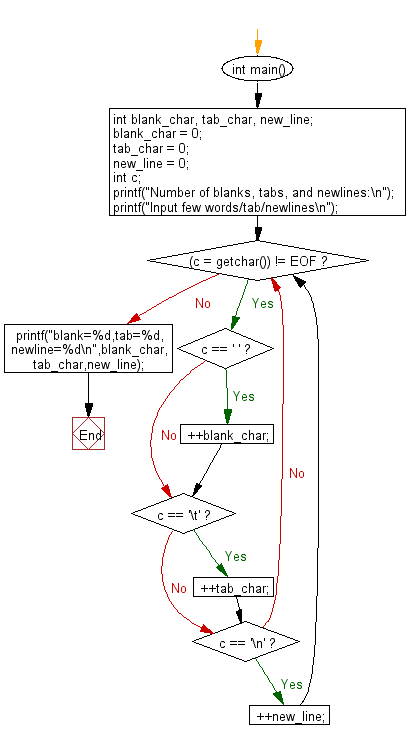C Exercises: Count blanks, tabs, and newlines in an input text.
C Basic Declarations and Expressions: Exercise-96 with Solution
Write a C program to count blanks, tabs, and newlines in an input text.
Sample Solution:
C Code:
#include <stdio.h>
int main()
{
int blank_char, tab_char, new_line;
blank_char = 0;
tab_char = 0;
new_line = 0;
int c;
printf("Number of blanks, tabs, and newlines:\n");
printf("Input few words/tab/newlines\n");
for (; (c = getchar()) != EOF;)
{
if ( c == ' ' ){
++blank_char;
}
if ( c == '\t' ){
++tab_char;
}
if ( c == '\n' ){
++new_line;
}
}
printf("blank=%d,tab=%d,newline=%d\n",blank_char,tab_char,new_line);
}
Sample Output:
Number of blanks, tabs, and newlines: Input few words/tab/newlines The quick brown fox jumps over the lazy dog ^Z blank=7,tab=2,newline=3
Flowchart:

C programming Code Editor:
Contribute your code and comments through Disqus.
Previous:Write a C program to print the corresponding Fahrenheit to Celsius and Celsius to Fahrenheit.
Next: Write a C program to replace more than one blanks with a single blank in a input string.
What is the difficulty level of this exercise?
Test your Programming skills with w3resource's quiz.
C Programming: Tips of the Day
Static variable inside of a function in C
The scope of variable is where the variable name can be seen. Here, x is visible only inside function foo().
The lifetime of a variable is the period over which it exists. If x were defined without the keyword static, the lifetime would be from the entry into foo() to the return from foo(); so it would be re-initialized to 5 on every call.
The keyword static acts to extend the lifetime of a variable to the lifetime of the programme; e.g. initialization occurs once and once only and then the variable retains its value - whatever it has come to be - over all future calls to foo().
Ref : https://bit.ly/3fOq7XP
- New Content published on w3resource:
- HTML-CSS Practical: Exercises, Practice, Solution
- Java Regular Expression: Exercises, Practice, Solution
- Scala Programming Exercises, Practice, Solution
- Python Itertools exercises
- Python Numpy exercises
- Python GeoPy Package exercises
- Python Pandas exercises
- Python nltk exercises
- Python BeautifulSoup exercises
- Form Template
- Composer - PHP Package Manager
- PHPUnit - PHP Testing
- Laravel - PHP Framework
- Angular - JavaScript Framework
- Vue - JavaScript Framework
- Jest - JavaScript Testing Framework
